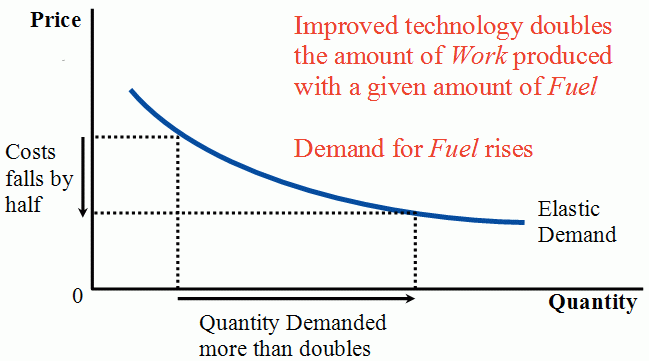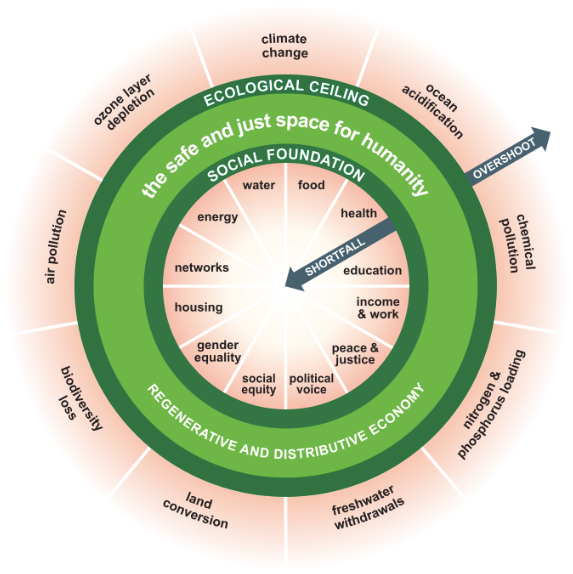Have you ever noticed that when an extra lane is added to a highway to reduce congestion it typically clogs up with cars soon after it's added? Or that the quicker you respond to emails, the more you receive in return? This is what is often called the efficiency paradox: the more efficient we make something, the more we use it.

More roads may reduce the time it takes for individual trips, but overall, it makes it possible for more cars to be on the road, and it encourages the formation of a culture built around car travel. With more efficient roadways, we actually end up spending more time in the car. The same is true with email. The more efficiently we send and respond to emails, the more replies and requests come our way, building a dependency loop that is difficult to get out of.
Perhaps the most consequential example of this that we face is our use of fossil fuels. In 1865, a man named William Stanley Jevons predicted that as England's use of coal became more efficient, overall consumption would increase dramatically - and he was right. England's culture was (and still is) focused on continual economic expansion, and more efficient use of coal enabled such growth, which in turn led to a dramatic increase in its use.

The same has proven true of oil and natural gas. We have figured out how to extract, process, ship, and burn these fuels extremely efficiently, lowering the financial costs dramatically for producers and consumers. What we have failed to account for, however, is the terribly high non-financial costs to our planet, seen most dramatically in the form of pollution and climate change. We have also failed to account for the cost to our culture, which is focused on perpetual growth and consumption undergirded by an unrelenting foundation of discontent.
I am all for exploring and using new technologies that help us heal what we have damaged and guide us toward more sustainable ways of living. God bless solar panels and electric vehicles and public transportation and, for the most part, the internet. But we must see that technology will not save us. The way forward requires, first and foremost, cultural change. I do not know all the cultural changes we need, but here is one that is absolutely essential.
Building A Culture of Restraint
I often call this the cardinal virtue for those of us who live in cultures of efficient overconsumption. It may not have the same beauty or appeal of the three major Christian virtues - faith, hope, and love - but in our age of ecological crisis, it may be the best way to live them out. The human struggle with restraint is as old as Adam and Eve, who could not restrain themselves from taking fruit from the only forbidden tree in Eden. We have taken this original transgression a step further, turning restraint into a vice in order to justify the extraction of "fruit" from every corner of the earth. To highlight one recent example, the melting of Arctic ice, which should properly alarm us all, has led to a race among northern nations to claim new shipping lanes and underwater resources.
The virtue of restraint is practiced by saying no to something accessible, deliberately limiting one's choices for the greater good. It happens when we recognize that just because we can do or have something, it does not mean we should. Restraint can be practiced by each one of us; we can say no to products, services, and activities that harm ecosystems and the common good.
But personal restraint is not enough - it isn't fair to put all the burden on individuals. We must build restraint into the fabric of our cultural life. One bright light working to do this is the British economist Kate Raworth, who is working to upend the insanity of perpetual economic growth through what she calls Doughnut Economics. In the diagram below, you can see her vision for bringing humanity into a "safe and just space" that enables human thriving within the planet's limits.

For this to happen, societies that are living above the planet's ecological ceiling (in the "overshoot" area of the diagram) must reduce their impact - in other words, they must practice restraint. One principle Raworth lays out to get us there is to be "agnostic about growth." In other words, sometimes our households, businesses, churches, etc., need to grow, and sometimes they do not. Raworth argues that our goal should be thriving communities (household, neighborhood, region, nation, planet), not growing ones. Some communities, such as the city of Amsterdam, have adopted Raworth's economic model to guide them into a thriving future.
For ecological disciples, the practice of Sabbath can be understood as God's timeless invitation to a kind of Doughnut Economics. Sabbath is centered on restraint; for at least one day each week, we are called to restrain ourselves from working, striving, and producing. We are reminded that the world is not our own, that we live by the grace of God through the bounty of God's earth. We are also reminded through Sabbath stories, like the provision of manna in the wilderness, that there are limits to what we should gather and store. Practicing Sabbath is not an efficient way to live, at least as measured by the modern world - and that is why it is such a powerful gift for us.
The efficiency paradox traps us in cycles of consumption and discontent. Practicing restraint results in a different kind of paradox. Saying "no" to taking more than we need helps us realize we already have enough. Resisting the pull of perpetual growth enables us to enjoy what we have already been given. Living simply helps others to simply live. Restraint is an inefficient virtue worth cultivating.
With you on the Way,
James